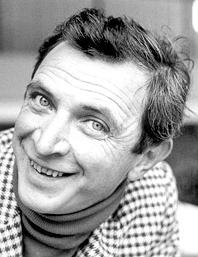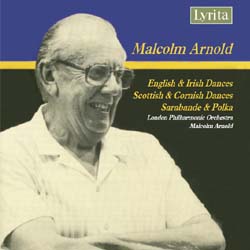Related Research Articles
This is a list of notable events in music that took place in the year 1951.

Sir Malcolm Henry Arnold was an English composer. His works feature music in many genres, including a cycle of nine symphonies, numerous concertos, concert works, chamber music, choral music and music for brass band and wind band. His style is tonal and rejoices in lively rhythms, brilliant orchestration, and an unabashed tunefulness. He wrote extensively for the theatre, with five ballets specially commissioned by the Royal Ballet, as well as two operas and a musical. He also produced scores for more than a hundred films, among these The Bridge on the River Kwai (1957), for which he won an Oscar.

Romeo and Juliet, Op. 64, is a ballet by Sergei Prokofiev based on William Shakespeare's play Romeo and Juliet. First composed in 1935, it was substantially revised for its Soviet premiere in early 1940. Prokofiev made from the ballet three orchestral suites and a suite for solo piano.
Gordon Percival Septimus Jacob CBE was an English composer and teacher. He was a professor at the Royal College of Music in London from 1924 until his retirement in 1966, and published four books and many articles about music. As a composer he was prolific: the list of his works totals more than 700, mostly compositions of his own, but a substantial minority of orchestrations and arrangements of other composers' works. Those whose music he orchestrated range from William Byrd to Edward Elgar to Noël Coward.

Hilding Constantin Rosenberg was a Swedish composer and conductor. He is commonly regarded as the first Swedish modernist composer, and one of the most influential figures in 20th-century classical music in Sweden.

John Mervyn Addison was a British composer best known for his film scores.
Joseph Horovitz was an Austrian-born British composer and conductor best known for his 1970 pop cantata Captain Noah and his Floating Zoo, which achieved widespread popularity in schools. Horovitz also composed music for television, including the theme music for the Thames Television series Rumpole of the Bailey, and was a prolific composer of ballet, orchestral, brass band, wind band and chamber music. He considered his fifth string quartet (1969) to be his best work.

John Cyril Cranko was a South African ballet dancer and choreographer with the Royal Ballet and the Stuttgart Ballet.
Arnold Atkinson Cooke was a British composer, a pupil of Paul Hindemith. He wrote a considerable amount of chamber music, including five string quartets and many instrumental sonatas, much of which is only now becoming accessible through modern recordings. Cooke also composed two operas, six symphonies and several concertos.
Four Scottish Dances (Op.59) is an orchestral set of light music pieces composed by Malcolm Arnold in 1957 for the BBC Light Music Festival.

English Dances, Op. 27 and 33, are two sets of light music pieces, composed for orchestra by Malcolm Arnold in 1950 and 1951. Each set consists of four dances inspired by, although not based upon, country folk tunes and dances. Each movement is denoted by the tempo marking, as the individual movements are untitled.
Sweeney Todd is a fictional homicidal barber.
The cultural year was dominated by the Festival of Britain and the opening of The Royal Festival Hall, the first dedicated concert hall of its size to be built in London since 1893: located on the south bank of the Thames, this was to host concerts by major orchestras from Britain and abroad. The Festival itself was a celebration of music, art and theatre. It notably provided an opportunity for the staging of many events seen during the first Folk music Festival held in Edinburgh, organised with the help of such talents as the American Alan Lomax, the Irish traditional musician Seamus Ennis and the political theatre director Ewan MacColl, who would go on to form the Ballad and Blues Club.
Homage to the Queen, Op. 42, by Malcolm Arnold was written as the official coronation ballet in 1953, commissioned by the Sadler's Wells Ballet in honour of Queen Elizabeth II, the ballet company's musical adviser Humphrey Searle having recommended Arnold for the job. The original choreography was created by Frederick Ashton. It was first performed by the Sadler's Wells Ballet on Coronation night 2 June 1953 at the Royal Opera House Covent Garden, with original scenery and costumes by Oliver Messel. The Orchestra was conducted by Robert Irving.
Martin Yates is a British conductor. After attending Kimbolton School, he studied at the Royal College of Music and Trinity College of Music, London, where his teachers included Bernard Keeffe (conducting), Richard Arnell (composition), Ian Lake, Jakob Kaletsky and Alan Rowlands (piano), and Douglas Moore and John Burden.
Guy Douglas Hamilton Warrack was a Scottish composer, music educator and conductor. He was the son of John Warrack of the Leith steamship company, John Warrack & Co., founded by Guy's grandfather, also called John.
John Hollingsworth was a British orchestral conductor prominent in the concert hall, the ballet and opera theatre, and the film studio. He was Sir Malcolm Sargent's assistant conductor at The Proms, where he conducted over 60 times including some world and British premieres. He also conducted at the Royal Opera and Sadlers Wells, and became associated with music for British horror films of the 1950s and early 1960s.
Desmond Doyle was a South African ballet dancer who performed in England in the 1950s and 1960s before becoming ballet master of The Royal Ballet.
Peterloo, Op. 97, is a concert overture by Malcolm Arnold written in 1968 to commemorate the centenary of the first meeting of the Trades Union Congress. It is a programme piece which depicts the Peterloo Massacre of 1819. It was given a mixed reception by critics, but has nevertheless become one of Arnold's best-known works, being arranged several times for wind or brass band, recorded many times, and played twice at the Proms, once in its original form and once in a choral arrangement to words by Sir Tim Rice.
References
- ↑ Percival J. Theatre in my blood - a biography of John Cranko. The Herbert Press Ltd, London, 1983.
- ↑ Bland A. The Royal Ballet – the first 50 years. Threshold Books, London, 1981.
- ↑ Burton-Page P. Liner notes for Conifer Classics recording CDCF224 (Royal Philharmonic Orchestra, Vernon Handley), 1993.